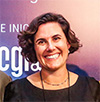
Preliminary Teachers List
- Mireille Hildebrandt (Vrije Universiteit Brussel / Radboud University)
- Julia Powels (University of Cambridge)
- Paul Dourish (University of California, Irvine)
- Frederik Zuiderveen Borgesius (Vrije Universiteit Brussel)
- Lina Dencik (Cardiff University)
- Malte Ziewitz (Cornell University)
- Robin Pierce (Tilburg University)
- Martijn van Otterlo (Tilburg University)
- Krishna Gummadi (Max Planck Institute)
Teacher Biographies
Robin Pierce Robin Pierce, JD, PhD, is associate professor at the Tilburg Institute for Law, Technology, and Society (TILT, Tilburg University, The Netherlands). She obtained her law degree (Juris Doctor) from University of California, Berkeley and a PhD from Harvard University where her work focused on genetic privacy. She has taught courses in Data Protection and Privacy, Ethical and Legal Issues in Biotechnology, and Social Issues in Biology. She currently teaches a course on Regulation for the LLM Law & Technology at Tilburg Law School. Her current research addresses the themes of data protection law and health data, as well as legal, policy and ethical issues regarding AI in healthcare, and regulation of novel biomedical technologies.
Paul Dourish Paul Dourish is Chancellor's Professor of Informatics and Associate Dean for Research in the Donald Bren School of Information and Computer Sciences at UC Irvine, with courtesy appointments in Computer Science and Anthropology. He also holds the position of Honorary Senior Fellow in Computing and Information Systems at the University of Melbourne. His research focuses primarily on understanding information technology as a site of social and cultural production; his work combines topics in human-computer interaction, social informatics, and science and technology studies. He is the author of several books, most recently “The Stuff of Bits: An Essay on the Materialities of Information” (MIT Press, 2017). He is a Fellow of the ACM, a Fellow of the BCS, a member of the SIGCHI Academy, and a recipient of the AMIA Diana Forsythe Award and the CSCW Lasting Impact Award. Before coming to UCI, he was a Senior Member of Research Staff in the Computer Science Laboratory of Xerox PARC; he has also held research positions at Apple Computer and at Rank Xerox EuroPARC. He holds a Ph.D. in Computer Science from University College, London, and a B.Sc. (Hons) in Artificial Intelligence and Computer Science from the University of Edinburgh.
Mireille Hildebrandt Mireille Hildebrandt is a tenured Research Professor on 'Interfacing Law and Technology' at Vrije Universiteit Brussels (VUB), appointed by the VUB Research Council. She works with the research group on Law Science Technology and Society studies (LSTS) at the Faculty of Law and Criminology. She also holds the part-time Chair of Smart Environments, Data Protection and the Rule of Law at the Science Faculty, at the Institute for Computing and Information Sciences (iCIS) at Radboud University Nijmegen. Her research interests concern the implications of automated decisions, machine learning and mindless artificial agency for law and the rule of law in constitutional democracies. She has published 4 scientific monographs, 21 edited volumes or special issues, and over 100 chapters and articles in scientific journals and volumes. (see more)
Malte Ziewitz Malte Ziewitz is Assistant Professor at the Department of Science & Technology Studies at Cornell University. As an ethnographer and analyst, he studies the changing role of governance and regulation in, of, and through digitally networked environments - the dynamics at work, the values at stake, the design options at hand. Previously, he was a post-doctoral fellow at the Department of Media, Culture, and Communication and the Information Law Institute at NYU.
Krishna Gummadi Krishna Gummadi is a tenured faculty member and head of the Networked Systems research group at the Max Planck Institute for Software Systems (MPI-SWS) in Germany. He also holds an honorary professorship at the University of Saarland. Krishna's research interests are in the measurement, analysis, design, and evaluation of complex Internet-scale systems. His current projects focus on understanding and building social computing systems. Specifically, they tackle the challenges associated with (i) assessing the credibility of information shared by anonymous online crowds, (ii) understanding and controlling privacy risks for users sharing data on online forums, (iii) understanding, predicting and influencing human behaviors on social media sites (e.g., viral information diffusion), and (iv) enhancing fairness and transparency of machine (data-driven) decision making in socio-technical systems. Krishna's work on online social networks, Internet access networks, and peer-to-peer systems has been widely cited and his papers have received numerous awards, including SIGCOMM Test of Time, IW3C2 WWW Best Paper Honorable Mention, and Best Papers at NIPS ML & Law Symposium, ACM COSN, ACM/Usenix SOUPS, AAAI ICWSM, Usenix OSDI, ACM SIGCOMM IMC, and SPIE MMCN. He has also co-chaired AAAI's ICWSM 2016, IW3C2 WWW 2015, ACM COSN 2014, and ACM IMC 2013 conferences. He received an ERC Advanced Grant in 2017 to investigate “Foundations of Fair Social Computing”.
Lina Dencik Dr Lina Dencik works at Cardiff University’s School of Journalism, Media and Culture (JOMEC). Her research concerns the interplay between media developments and social and political change, with a particular focus on resistance. In recent years, she has moved into the areas of digital surveillance and the politics of data and she is Co-Founder of the Data Justice Lab. Lina has written several articles and books, most recently, Digital Citizenship in a Datafied Society (with Arne Hintz and Karin Wahl-Jorgensen, Polity Press, 2018). Her current project, funded by an ERC Starting Grant, is ‘Data Justice: Understanding datafication in relation to social justice’ (DATAJUSTICE).
Julia Powles Julia Powles is a research fellow in technology law and policy at New York University School of Law and Cornell Tech. Her current projects focus on privacy, antitrust, and intellectual property in relation to data-driven technologies. She is widely published in academic and popular outlets, with bylines in the Financial Times, Guardian, New Yorker, Slate, and Wired, among others. Prior to coming to New York, Powles was a postdoctoral fellow in law and computer science at the University of Cambridge, a contributing editor and policy fellow at the Guardian, and speechwriter for the director general of the World Intellectual Property Organization. She has worked as an attorney, bioscience researcher, and clerked in the Federal Court of Australia and Administrative Appeal Tribunal. A former Commonwealth Scholar, Powles holds a Ph.D. in law from the University of Cambridge, a B.C.L. from the University of Oxford, a LL.B. (Hons) from the University of Western Australia, and a B.Sc. (Hons) from the Australian National University.
Frederik Zuiderveen Borgesius Dr. Frederik Zuiderveen Borgesius is a researcher (Marie Curie fellow) at the LSTS Research Group on Law, Science, Technology & Society, at the Vrije Universiteit Brussel. His research interests include privacy, data protection, discrimination, and freedom of expression – especially in the context of new technologies. In 2017 he received an EU Marie Curie grant to conduct research into the legal implications of machine learning and automated profiling: To protect the right to non-discrimination and other human rights, should the law be amended in the light of automated profiling, and if so, how? He obtained his Research Master’s degree at the Institute for Information law (IViR), at the University of Amsterdam. He studied for one semester at Hong Kong University. He also spent a semester at New York University for research. His book ‘Improving privacy protection in the area of behavioural targeting’ was published in 2015 by Kluwer Law International. He has presented at many international conferences, and at the Dutch and the European parliaments. He regularly comments in the media. He is a member of the Meijers Committee, an independent group of experts in the field of European law. He is also a member of the board of editors of the European Data Protection Law Review, and of the Dutch journals Computerrecht (Computer Law) and the Nederlands Tijdschrift voor Mensenrechten (journal of the Dutch Section of the International Commission of Jurists). He is a fellow of the Institute for Information law (IViR) and the Personalised Communication project, both at the University of Amsterdam.
Martijn van Otterlo Dr.ir. Martijn van Otterlo is an assistant professor in artificial intelligence (AI) in the cognitive science and artificial intelligence (CSAI) department of Tilburg University (The Netherlands). Martijn obtained his PhD from the University of Twente (Netherlands, 2008) with a dissertation on expressive knowledge representation in machine learning from evaluative feedback (e.g. reinforcement learning). He published two books on such adaptive learning algorithms (2009 IOS Press; 2012 Springer, together with Dr. Wiering). Martijn has worked on robotics, vision and language and held academic positions in Freiburg (Germany), Leuven (Belgium), Nijmegen and Amsterdam (The Netherlands). His second research interest, which arose from his expertise in AI, concerns the ethics and implications of adaptive algorithms on privacy, surveillance and society. He is particularly interested in “value alignment”: making intelligent machines that respect, understand, and act according to, human values. He has served as committee member and reviewer for dozens of international journals and conferences on machine learning, data science and artificial intelligence. In recent years, Martijn combines data science and ethics with his third interest: libraries. He currently studies the digitalization of physical, public libraries, and also the ethical consequences of datafication of library processes and services. (see more)








